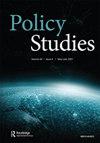政策风格与印度国家气候变化行动计划(NAPCC)
IF 2.3
4区 管理学
Q2 PUBLIC ADMINISTRATION
引用次数: 0
摘要
本文评估了印度在气候变化方面的政策风格,特别是国家气候变化行动计划(NAPCC)的启动。NAPCC是印度第一份重要的气候政策文件,它展示了从“结构性冲突”政策范式向“嵌入式自由主义”政策范式的转变。来自印度政府的“嵌入式自由主义”政策思想对NAPCC的形成具有重要意义。NAPCC的制定是基于积极主动和部分协商一致的政策风格。国内气候政策的“学习和困惑”决策过程涉及相关的国家和非国家行为体,政策理念由总理办公室(PMO)“推动”。本文探讨了国家和非国家行为体之间的相互作用,发现在新兴大国的全球愿望背景下,印度政府在一个嵌入的自由气候政策范式下促进并领导了NAPCC的制定。本文章由计算机程序翻译,如有差异,请以英文原文为准。
Policy styles and India’s national action plan on climate change (NAPCC)
This article assesses India’s policy style, with respect to climate change particularly the launch of the National Action Plan on Climate Change (NAPCC). The NAPCC was India’s first significant climate policy document that demonstrates a paradigm shift from the “structural conflict” policy paradigm towards “embedded liberalism”. Policy ideas favouring “embedded liberalism” emerged from the Indian state were significant for the formulation of the NAPCC. The NAPCC was formulated due to a proactive and partially consensual policy style. The policymaking processes of “learning & puzzling” regarding a domestic climate policy involved relevant state and non-state actors and the policy idea was “powered” by the Prime Minister’s Office (PMO). This article explores interactions between state and non-state actors to find that the Indian government, in the context of the global aspirations of an emerging power faciliated and led the formulation of the NAPCC under an embedded liberal climate policy paradigm.
求助全文
通过发布文献求助,成功后即可免费获取论文全文。
去求助
来源期刊

Policy Studies
PUBLIC ADMINISTRATION-
CiteScore
5.40
自引率
4.50%
发文量
34
期刊介绍:
These changes at the structural level of the global system have impacted upon the work of public organizations either directly or indirectly and have broadened the field of action in policy studies. It has five main areas of intellectual interest: 1.To broaden the lens of policy analysis through the publication of research which locates policy-making within a theoretical, historical or comparative perspective. 2.To widen the field of enquiry in policy analysis through the publication of research that examines policy issues in a British, comparative, international or global context. 3.To promote constructive debate on theoretical, methodological and empirical issues in policy analysis.
 求助内容:
求助内容: 应助结果提醒方式:
应助结果提醒方式:


